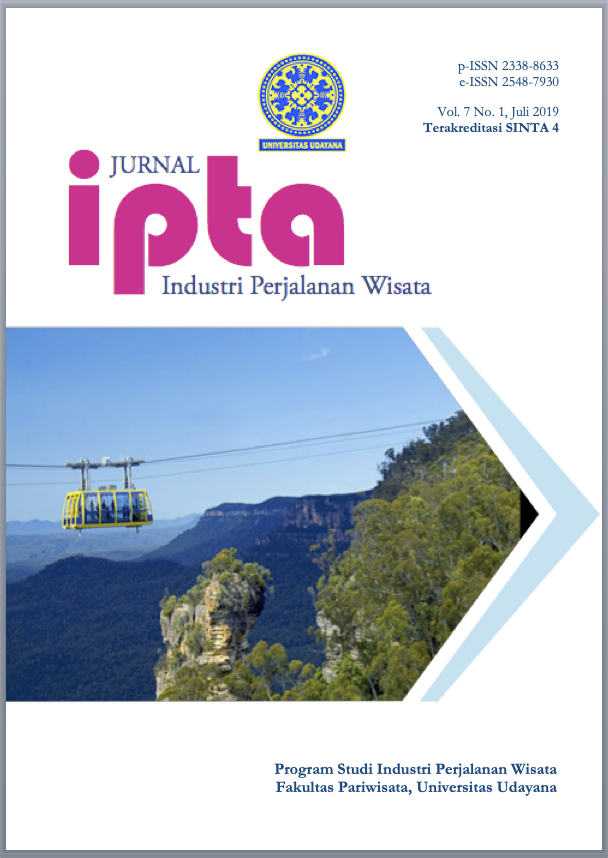A MODEL OF COMMUNITY-BASED RURAL TOURISM PRODUCTS DEVELOPMENT
Abstract
The local community always took for granted the establishment of a tourist village as a rural tourism product. Likewise prevailed in Pinge Tourism Village, Tabanan Regency, Bali. In the context of developing rural tourism products in the Pinge Tourism Village, the participation of local communities is required to ensure the sustainability of tourism in rural areas. This paper aims to build a model for developing local community-based rural tourism products in Pinge Tourism Village. Community-based tourism (CBT) approaches are used to formulate models for rural tourism product development. The required data is collected through observation and interviews and then analyzed descriptively. The results of the analysis indicate local community-based rural tourism products are tourist pull factors in rural areas in the form of environmental characteristics and the practice of rural communities. The uniqueness of rural character and rural community routines are tourism capital posses by local communities. In addition to physical and socio-cultural uniqueness, rural tourism products are also determined by conformity with the target market. The existence of this rural tourism product model can increase local community participation in decision making and sharing of tourism benefits.
Downloads
References
Bramwell, B., 2010, Participative Planning and Governance for Sustainable Tourism. Tourism Recreation Research, 35: 239-249.
Byrd, Erick T., Bosley, Holly E., and Dronberger, Meghan G., 2009, Comparisons of stakeholder perceptions of tourism impacts in rural eastern North Carolina, Tourism Management, 30: 693-703.
Feighery, William G. 2008. “Heritage Tourism in Xi’an: Constructing the Past in Contested Space”. Dalam Janet Cochrane (ed). Asian Tourism: Growth and Change. Elsevier, UK.
George, E. Wanda, Mair, H., and Reid, Donald G. 2009. Rural Tourism Development: Localism and Cultural Change. Channel View Publications, UK.
Gunn, C. A. and Var, T., 2002, Tourism Planning: Basics, Concepts, Cases, Routledge, London.
Garrod, B., Wilson, J.C., and Bruce, D.B., 2001, Planning for Marine Ecotourism in the EU Atlantic Area: Good Practice Guidelines, Project Report, University of the West of England, Bristol.
Idziak, W., Majewski, J., and Zmyślony, P., 2015, Community participation in sustainable rural tourism experience creation: a long-term appraisal and lessons from a thematic villages project in Poland, Journal of Sustainable Tourism, 23:1341-1362.
Murphy, Peter E., 1985, Tourism A Community Approach, Methuen, New York.
Reid, D. G., George, E. W., and Mair, H., 2009, Rural Tourism Development; Localism and Cultural Change, Channel View Publications, UK.
Roberts, L. and Hall, D., 2004, Consuming the countryside: Marketing for rural tourism, Journal of Vacating Marketing, 10: 253-263.
Singh, S., Timothy, D. J., and Dowling, R. K., 2003, Tourism in Destination Communities, CABI, UK.
Timothy, Dallen J. and Boyd, Stephen W., 2003, Heritage Tourism, Pearson Education, England.
Zou, T., Huang, S., and Ding, P., 2014, Toward A Community-driven Development Model of Rural Tourism: The Chinese Experience, International Journal of Tourism Research, 16: 261-271.





